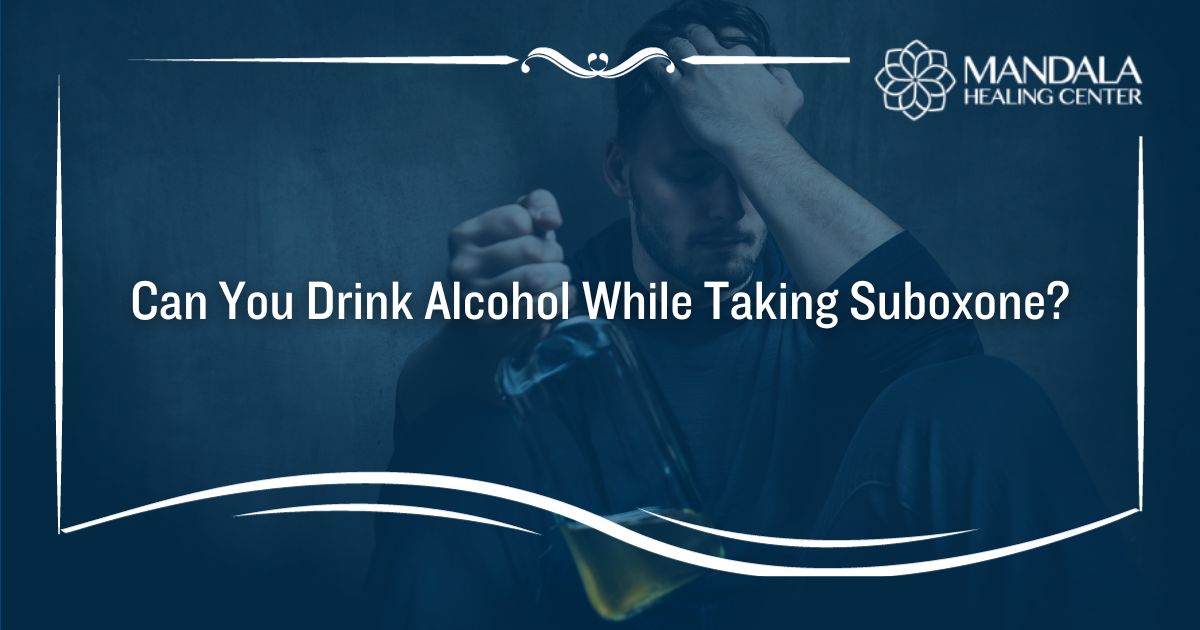Opioid addiction is continuing to rise each year, with 80,411 people suffering from an opioid overdose in 2021.[1] Thankfully, addiction treatment experts have created a more aggressive approach to treating opioid use disorder known as medication-assisted treatment (MAT).
MAT involves the use of medications to limit withdrawal symptoms during detox and prevent cravings during early recovery. One of the most common medications used during MAT programs is Suboxone.
Suboxone is a combination medication that includes buprenorphine and naloxone. If you are taking this medication, you might be wondering whether you can still drink alcohol. Unfortunately, mixing Suboxone and alcohol can lead to a variety of adverse effects, including overdose and coma.
Can You Drink Alcohol While Taking Suboxone?
Suboxone contains buprenorphine and naloxone. Buprenorphine is a partial opioid agonist, which means it partially activates opioid receptors in the brain to limit symptoms of withdrawal and cravings.[2] On the other hand, naloxone is an opioid antagonist, which means it blocks other opioids from affecting the person taking Suboxone.
When used as directed, Suboxone is completely safe to take. However, when abused, it can lead to respiratory depression because it does contain an opioid.
Alcohol is also a central nervous system depressant. If you were to drink alcohol while taking Suboxone, your risk of experiencing respiratory depression increases greatly.
According to the National Institute of Alcohol Abuse and Alcoholism (NIAAA), “Combining alcohol with certain medications, particularly those with sedative effects, can increase the risk of adverse events, including falls, driving accidents, and fatal overdoses.”[3]
Risks of Mixing Alcohol and Suboxone
If you or a loved one take Suboxone, it’s important to be aware of the dangers you could face if you drink alcohol. Combining Suboxone and alcohol can increase your chances of relapsing on opioids, lower your inhibitions, cause a variety of physical health concerns, and even lead to a coma.
The risks of mixing Suboxone and alcohol include:
Coma
The most concerning danger of combining Suboxone and alcohol is the fact that you could fall into a coma. Since Suboxone and alcohol are both central nervous system depressants, their sedative effects could become exacerbated.
This could lead to:
- Severe drowsiness
- Decreased awareness of your surroundings
- Breathing issues
When your breathing is slowed, it deprives your brain cells of the oxygen they need to function. These brain cells can die, causing you to fall into a sleep you might not wake up from, which is one of the many reasons you should avoid drinking alcohol while taking Suboxone.
Increased Risk of Relapse
Suboxone is intended to be used as a treatment for opioid use disorder. If you begin drinking alcohol, you might feel like you could use an opioid again. Additionally, alcohol can lead to feelings of depression, which can trigger a relapse during early recovery.
Relapsing on opioids after a period of sobriety can be dangerous, increasing your chances of experiencing an overdose as you no longer have a tolerance.
Lowered Inhibitions
When you combine alcohol and Suboxone, your brain functions can slow down to the point that it is not regulating your decision-making properly. As a result, your inhibitions may be lowered, causing you to engage in behaviors that you never would sober. For example, lowered inhibitions can lead to unsafe sex, fighting with loved ones, or driving while intoxicated.
Physical Health Issues
If you have been abusing alcohol long-term, there are several adverse health effects you could begin to experience. Your chances of developing these health conditions are increased when alcohol is combined with Suboxone.
Examples of physical health conditions stemming from long-term alcohol abuse include:
- Cardiovascular diseases like high blood pressure, heart disease, and stroke
- Liver and kidney damage
- Cancer of the breast, mouth, liver, esophagus, throat, colon, or rectum
- A weakened immune system
- Depression, anxiety, or memory issues
Alcohol abuse can also lead to alcoholism, so it is best to avoid drinking alcohol if you are taking Suboxone or are in recovery from opioid addiction. If you struggle with alcohol use disorder, the doctor providing your Suboxone can provide you with resources to overcome your addiction.
Find Help for Alcohol and Suboxone Abuse
If you combine alcohol and Suboxone, you are at risk of experiencing a variety of health issues, including respiratory depression, comas, and relapse. Thankfully, addiction treatment programs can help you overcome your alcoholism to prevent you from mixing it with your Suboxone.
At Mandala Healing Center, we can provide compassionate and clinically proven addiction treatment services, such as evidence-based behavioral therapy, group counseling, and relapse prevention planning. Our alumni program will also offer you the supportive community you need to maintain long-term sobriety.
To learn more about our compassionate treatment program, please contact Mandala Healing Center today.
References:
- The National Institute on Drug Abuse (NIDA): Drug Overdose Death Rates, Retrieved November 2023 From https://nida.nih.gov/research-topics/trends-statistics/overdose-death-rates
- The Substance Abuse and Mental Health Services Administration (SAMHSA): What is Buprenorphine, Retrieved November 2023 From https://www.samhsa.gov/medications-substance-use-disorders/medications-counseling-related-conditions/buprenorphine
- The National Institute of Alcohol Abuse and Alcoholism (NIAAA): Alcohol-Medication Interactions, Retrieved November 2023 From https://www.niaaa.nih.gov/health-professionals-communities/core-resource-on-alcohol/alcohol-medication-interactions-potentially-dangerous-mixes












